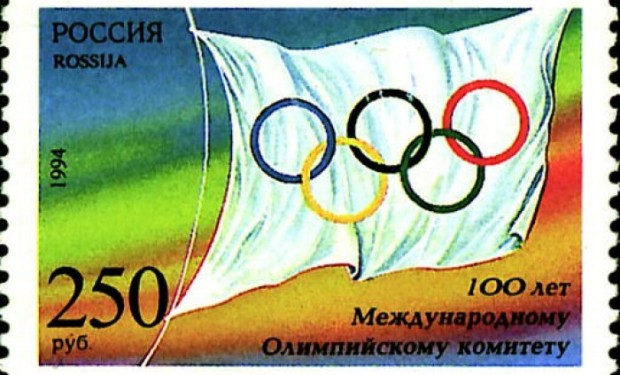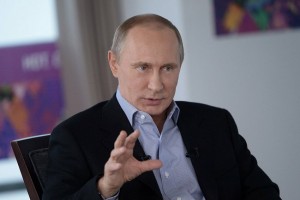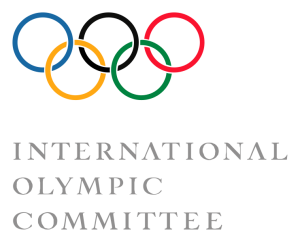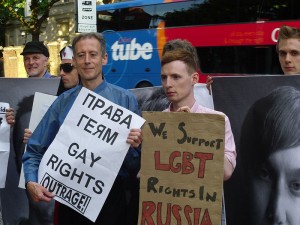International Human Rights: An optical view of Russia’s anti-gay propaganda law
As the 2014 Olympics in Sochi, Russia quickly descend upon aficionados of winter sports, it too has already found its place in Olympic controversies.
BY: Gerren C. Mobley, Guest Contributor
Editor’s Note: The Campbell Law Observer has partnered with Judge Paul C. Ridgeway, Resident Superior Court Judge of the 10th Judicial District, to provide students from his International Business Litigation and Arbitration seminar the opportunity to have their research papers published with the CLO. The following article is one of many guest contributions from Campbell Law students to be published over the next two weeks.
Nothing is more fascinating than watching the Olympic Games. It is an event that occurs once every four years and allows the nations of the world to temporarily suspend all political discourse and take pride in the athletic ambassadors of their countries. For that brief two or three-week period, one lucky host city is transformed into a mystical palace that could only rival that of Ancient Greece. However, not every Olympic session is met with such revere.

Gerren Mobley
In the past, the Olympics have often been the perfect platform to make political statements. During the Olympic Games of 1908, athletes from Ireland boycotted the Olympics in London because Britain refused to give Ireland its independence. The 1936 games in Berlin were boycotted by Jewish athletes in protest of Nazi propaganda. However, despite this long history of boycotts, the most effective political statements came during the commencement of the games. These political statements were geared towards issues surrounding human rights. For example, during the 1968 Olympic Games in Mexico, two U.S. athletes, Tommy Smith and John Carlos, raised their hands to salute black power from the podium stand. Although they were expelled on the grounds that all political gestures are banned from Olympic ceremonies, the gesture had a significant impact in the Civil Rights Movements of the 1960s.
As the 2014 Olympics in Sochi, Russia quickly descend upon aficionados of winter sports, it too has already found its place in Olympic controversies. On June 30, 2013, the Russian President Vladimir Putin signed a bill into law banning the propaganda of nontraditional sexual relations to minors, also referred to as the “gay propaganda law.” In the immediate wake of becoming law, the act has drawn the ire of the lesbian, gay, bisexual, and transgender (LGBT) communities. Even further has been the noticeable outcry from the international community as various human rights associations have condemned the anti-LGBT legislation. However with little to no information on what propaganda is considered to be, “nontraditional sexual relations to minors,” the scope of this new law poses the risk that many in the LGBT community will run afoul of this law.
The broad scope of the gay propaganda law could only spell disaster for Russian courts, as judicial-technical inexactitudes will surely ensue.
According to Article 6.21 of the Code of the Russian Federation on Administrative Offensives, propaganda is the act of distributing information among minors that is (1) aimed at the creating nontraditional sexual attitudes, (2) makes nontraditional sexual relations attractive, (3) equates the social value of traditional and nontraditional sexual relations, or (4) creates an interest in nontraditional sexual relations. The broad scope of this language could only spell disaster for Russian courts, as judicial-technical inexactitudes would surely ensue.
Since the passage of this law, the courts have yet to review any case in which a person, either Russian or a foreign visitor, has been held liable for a violation. The closest example of any person(s) being accused of violating this law came just shortly after the passage of the bill. On July 21, 2013, four Dutch tourists were arrested by Russian police. The group of Dutch men and women arrived in the city of Murmansk to make a film about the city as well as the city’s LGBT community. While there was no evidence to suggest that the group was specifically targeting minors, they were still charged because one of the seminar participants lied about his age and was actually seventeen at the time, which is considered to be a minor in Russia.
Currently, the trial for the four Dutch men and women has been postponed, but the burning question still remains as to exactly what constitutes gay propaganda. Outside of this one incident, there have been emerging reports that people are being arrested for kissing and holding hands, as well as wearing or using rainbows in public. However, if there is anything that can be sifted through the ambiguity, it is that this law has the potential to have broad implications to members of the LGBT community and advocates of gay rights.
The punishment sends a strong message that gay propaganda of any kind is both unwelcome and strictly forbidden.
Unlike the cloud of ambiguity that exists as to what constitutes gay propaganda, what is less ambiguous is what the punishment can be for potential violators. Although homosexuality is no longer a criminal offense in Russia, this new law definitely walks a fine line between what is a criminal offense and what is a civil offense. The law itself can be broken down into one of two ways, (1) if you are a Russian citizen, or (2) if you are a foreign visitor. In either case, the punishment definitely sends a strong message that gay propaganda of any kind is both unwelcome and strictly forbidden.
If you are a Russian citizen held to be violating this law, you can be fined anywhere between 4000 and 5000 rubles (120-150 USD). The same amount applies if you are a foreign visitor, but you also face the additional threat of deportation and/or up to fifteen days in a Russian jail. The amounts go up exponentially depending on the medium of the propaganda or occupation/affiliation of the person. For example, Russian citizens who are also public officials can be subject to fines of 40,000 to 50,000 rubles (1200-1500 USD). Additionally, if the violator is a registered organization, it could be subject to fines as high as one million rubles (30,000 USD) or be suspended from operations for up to ninety days.
Does the Russian Anti-LGBT Law Violate International Human Rights Standards?
In short, the answer to this question is yes, but not necessarily international laws or treatises. According to the European Convention of Human Rights1“everyone has a right to respect his private and family life, his home and his correspondence. Furthermore everyone has a right to freedom of expression. The right shall include the freedom to hold opinions and to receive and impart information and ideas without interference by public authority. However this right does not preclude the interest of national security, public safety, or the protection of health or morals…” Lastly, “the enjoyment of the rights and freedoms set forth in this Convention shall be secured without discrimination on any ground such as sex, race, color, language, religion, political or other opinion, national or social origin, association with a national minority, property, birth or other status.”
While again this law does not necessarily violate any specific international laws, as a signatory to the Council of Europe, Russia has acceded to the conventions passed by the Council and in this case has subjected itself to the standards promulgated within the European Convention of Human Rights. As a matter of fact, Russia has previously subjected itself to adjudicatory matters before the European Court of Human Rights, which enforces the provisions of the European Convention of Human Rights. The issue again centered around LGBT rights and the rights to peacefully assemble.
In October of 2010, the European Court of Human Rights ruled that Russia had violated the freedom of assembly by denying gay rights activists the right to hold gay pride marches. In rejecting Russia’s argument that there was no general consensus on issues relating to the treatment of sexual minorities, the ruling stated “that there is no ambiguity about the right of individuals to openly identify themselves as gay, lesbian, or any other sexual minority.” The court also found the Russian government’s argument was inconsistent with previous actions six months earlier when in fact the Russian government had acknowledge their support of the Committee of Ministers of the Council of Europe to end discrimination on the grounds of sexual orientation or gender identity. That particular document included provisions that specifically provided for the right to assemble and freedom of expression without discrimination based upon sexual orientation and gender identity. While Russia does manage to escape any violations of any international treaty, the winds of change are blowing strongly against anti-LGBT legislation.
The IOC has warned that any political gestures during the Olympic Games are in violation of the Olympic Charter, but how does this exactly square up with some of the fundamental principles found in the Olympic Charter?
As stated before, the Olympics have certainly been no stranger to controversy, but in the face of this latest controversy, the response from the International Olympic Committee (IOC) has been rather tepid. Currently, the IOC does not offer non-discrimination protections on sexual orientation, but just this past October, the United States Olympic Committee (USOC) has revised its non-discrimination policy to include sexual orientation. The USOC has been urging the IOC to adopt this resolution in its non-discrimination policy, but so far there has been little indication that the IOC will adopt this resolution. The IOC has warned that any political gestures during the Olympic Games are in violation of the Olympic Charter, but how does this exactly square up with some of the fundamental principles found in the Olympic Charter?
In the section entitled the “Fundamental Principles of Olympism” of the Olympic Charter, non-discrimination policies can be found in principles four and six. Specifically principal number four states “every individual must have the possibility of practicing sport, without discrimination of any kind…which requires mutual understanding with a spirit of friendship, solidarity, and fair play.” Furthermore principal six rejects any form of discrimination with regard to a country or a person on grounds of race, religion, politics, gender or otherwise, as being incompatible with belonging to the Olympic Movement. Lastly, principal seven explains that belonging to the Olympic Movement, requires compliance with the Olympic Charter and recognition by the IOC. While these fundamental principles and policies do not necessarily include sexual orientation, the broad language used to establish these policies could easily adopt a non-discrimination policy, which would include sexual orientation.
In hypothetical terms, if the IOC wanted to send a strong message to Russia or any future country hosting the Olympic Games, the IOC does have the right to withdraw from a host city. Paraphrased loosely, rule 36.2 of the Olympic Charter, leads with the statement that a failure of noncompliance with the Olympic Charter or other regulations or instructions of the IOC shall be deemed to be a breach of that host city. Further, no entity, government or otherwise, shall have any claim to any form of compensation against the IOC. This provision of the charter would be financially devastating to any host city or country hosting the games. As an example of Olympic costs, the past 2012 Olympics held in London, came to a grand total of over eight billion British pounds or just north of twelve billion US dollars.
In light of Russia’s anti-LGBT law, HRC has partnered with several international gay rights advocates in an effort to end Russia’s anti-LGBT practices and support members of the LGBT community abroad.
As expected, calls for boycotting the games have largely shadowed the normal excitement and anticipation around its start. However, what may be less expected are the collateral effects these boycotts are starting to have. Since the emergence of various forms of social media, members of the public have used these different forums to bring attention and to effectively run social media campaigns to bring about social change. For instance, the Human Rights Campaign (HRC) has long hailed the “Love Conquers Hate” slogan as a cornerstone message to increase LGBT awareness and acceptance in the US. In light of Russia’s anti-LGBT law, HRC has partnered with several international gay rights advocates in an effort to end Russia’s anti-LGBT practices and support members of the LGBT community abroad.
Even private corporations cannot be protected by the Olympic gods and goddesses from the adverse effects of social media campaigns. Major sponsors such as Procter and Gamble and Coca-Cola are currently being targeted for just being sponsors of the Olympic Games. While the financial impact of being a sponsor to the games in Sochi is yet to be seen, one thing that is clear is that both of these companies have broad non-discrimination policies that are in direct conflict(pdf) with the passage of the Russian law. If Olympic sponsors wanted to send a strong message to the Russian government and future governments, they could refuse their sponsorship of the Olympic Games, making it exceedingly difficult for the host city to raise revenue.
As suggested by the State Department’s website, LGBT tourist should “avoid excessive physical displays of affection in public, particularly in more conservative countries or regions.”
Unfortunately without much guidance on what constitutes gay propaganda, the US State Department has updated its website to give some guidance on various practical steps for LGBT visitors of the Sochi Olympics. As suggested by the State Department’s website, LGBT tourist should “avoid excessive physical displays of affection in public, particularly in more conservative countries or regions.” While this may seem like the US is acquiescing to the extreme viewpoints of the Russian government, the US Embassy in Moscow has affirmed the United States view on LGBT rights. According to the official US Embassy website for Moscow, it states that “the US places great importance on the protection of human rights and fundamental freedoms of all people, including gay, lesbian, bisexual and transgender persons, as well as those attending or participating in the Olympic and Paralympic Games.” Despite this overwhelming viewpoint in support of LGBT rights, the US State Department still stresses that LGBT visitors should be mindful and obey the laws of the foreign state.
If, while visiting Russia, American LGBT visitors run into legal issues, the State Department’s website also suggest that citizens contact the American Citizens Services (ACS) Section of the U.S. Embassy or consulate as a point of contact. This section of the website is designed to monitor and track all incidents that may occur to American citizens, regardless of sexual orientation, especially if U.S. citizens feel as though the local authorities may not be able to assist in their inquiry. There are also other helpful links to other external resources that LGBT visitors may find useful about other countries and regions of the world that may be potential dangerous for LGBT travel.
In previous years, the controversy was focused on freedom of recognition of statehood, religion or even racial equality, but this time around the call is aimed at the freedom to love.
In just a few short weeks, the 2014 Olympics in Sochi, Russia will commence and talented men and women from all around the world will descend upon the mid-size city located along the Black Sea. In their hearts will be the dreams and aspirations of finding their coveted place in history as an Olympic Medalist. Like many before them, they carry not only the heavy toll of being ambassadors from their countries, but ultimately become the unofficial spokesmen and spokeswomen for social change. And every four years the Olympics becomes that catalyst to speak to the injustices of that day. In previous years, the controversy was focused on freedom of recognition of statehood, religion or even racial equality, but this time around the call is aimed at the freedom to love.
The Russian law restricts that freedom in ways in which the Russian courts cannot even begin to interrupt. As members of the LGBT community in the country of Russia and elsewhere abroad anxiously await in how the courts will interpret what is gay propaganda, the intent of the law remains clear. The intent of the law is to ban homosexuality, but as one Russian lawmaker has pointed out in the past, laws like this are in violation of the Russian Constitution. Homosexuality is not illegal in Russia, but the passage of Article 6.21 of the Code of the Russian Federation on Administrative Offensives seeks to subterfuge what cannot be deemed illegal under the criminal code by making it illegal under the civil code. So how does one go about not violating this law? Essentially you have to just deny who you are and hope that your impulses can be controlled by your mind instead of your heart.
In closing, former Secretary of State Hillary Clinton’s statement to the United Nations in December 2011, describes gay rights as human rights because human rights are gay rights. Although Russia and other conservative countries may seek to characterize members of the LGBT as immoral despots out to destroy all of humanity, this characterization is often inconsistent on basic human rights that many countries like Russia have signed onto. Whether it is to abide by their own country’s constitution or be a subscriber to the conventions of various international human rights groups, it is incumbent upon these countries to at least uphold the basic human need to love and to be loved in return.
Gerren Mobley is a 3L student at Campbell Law School. Gerren may be reached via email at gc**********@************ll.edu.






